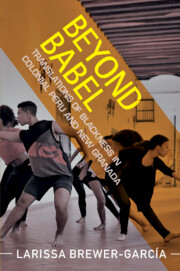Book contents
- Beyond Babel
- Afro-Latin America
- Beyond Babel
- Copyright page
- Dedication
- Contents
- Figures
- Acknowledgments
- Note on Transcriptions and Translations
- Introduction
- 1 Black Types between Renaissance Humanism and Iberian Counter Reformation Theology
- 2 The Transatlantic Slave Trade and Spanish American Missionary Translation Policy
- 3 The Mediations of Black Interpreters in Colonial Cartagena de Indias
- 4 Conversion and the Making of Blackness in Colonial Cartagena de Indias
- 5 Salvation and the Making of Blackness in Colonial Lima
- Coda
- Appendixes
- Bibliography
- Index
3 - The Mediations of Black Interpreters in Colonial Cartagena de Indias
Published online by Cambridge University Press: 22 July 2020
- Beyond Babel
- Afro-Latin America
- Beyond Babel
- Copyright page
- Dedication
- Contents
- Figures
- Acknowledgments
- Note on Transcriptions and Translations
- Introduction
- 1 Black Types between Renaissance Humanism and Iberian Counter Reformation Theology
- 2 The Transatlantic Slave Trade and Spanish American Missionary Translation Policy
- 3 The Mediations of Black Interpreters in Colonial Cartagena de Indias
- 4 Conversion and the Making of Blackness in Colonial Cartagena de Indias
- 5 Salvation and the Making of Blackness in Colonial Lima
- Coda
- Appendixes
- Bibliography
- Index
Summary
The collection of Jesuit texts describing black interpreters’ lives and labor in seventeenth-century Cartagena demonstrates that the black men and women employed as evangelical linguistic intermediaries before and after the publication of Alonso de Sandoval’s 1627 treatise were far from the invisible and easily replaceable assistants Sandoval suggests. In fact, the texts analyzed in this chapter provide rich details regarding the biographies and roles assigned to and adapted by the black interpreters in Cartagena. The interpreters’ stories, told in part through highly mediated accounts given by some of the black interpreters themselves, present them as linguistic and spiritual intermediaries who are leaders of black communities in the city and influential participants in the Jesuit mission. The sources demonstrate that the interpreters took advantage of the space of negotiation provided by the mission to acquire privileges unique to enslaved laborers during this period and became avenues for newly arrived black men and women to make some successful demands through their participation in the Jesuit mission.
Keywords
- Type
- Chapter
- Information
- Beyond BabelTranslations of Blackness in Colonial Peru and New Granada, pp. 116 - 163Publisher: Cambridge University PressPrint publication year: 2020

